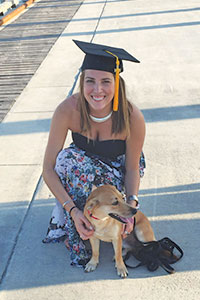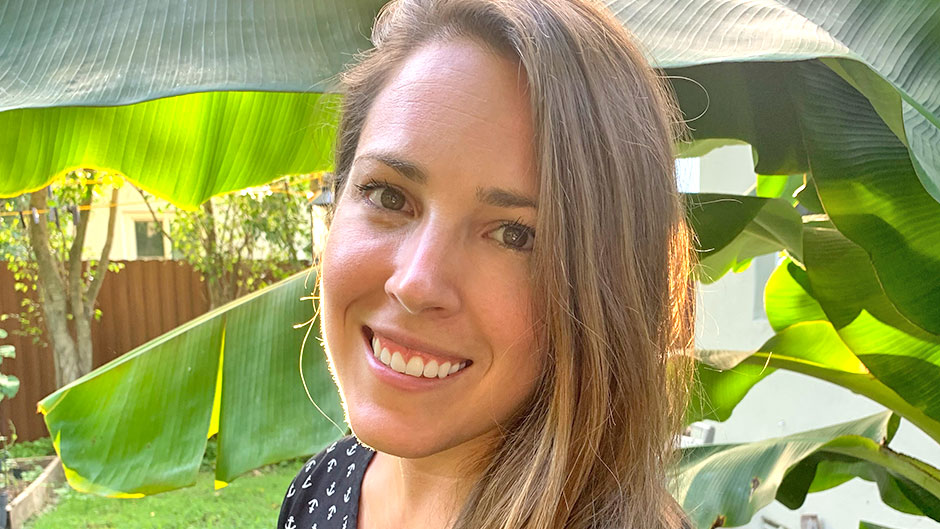For Shannon Jones, M.P.S. ’14, a childhood passion for dolphins set her on a career path that ultimately brought her to a graduate program in marine conservation at the University of Miami Rosenstiel School of Marine and Atmospheric Science, then to Miami’s Phillip and Patricia Frost Museum of Science, where she is conservation program manager. She is among the Rosenstiel School alumni working to engage and educate the public on the importance of coral conservation. 
At Frost Science, Shannon is involved in several educational and outreach programs, including Museum Volunteers for the Environment (MUVE), a volunteer-driven restoration program that works to restore coastal habitats, including coral reefs. She is also part of the team collaborating with Rosenstiel School scientists and other regional partners in the Southeast Florida Coral Reef Restoration Hub.
To Shannon, when it comes to preserving coral reefs and related habitats, engaging people and getting them involved is key.
What got you interested in marine conservation?
Since I was seven, I have been obsessed with dolphins. After undergrad, I took a research assistantship in Hawaii, where I studied the relationship between the local dolphin populations and tourism. A lot of people would just jump in the water and swim with them and didn’t know about the laws or rules in place to protect dolphins. That's where my passion for marine conservation came from. It's not just about making rules and enforcing them, it's engaging people and teaching them in a way that they can love the environment and want to do what's best for it while still having these great experiences. So that's what brought me to the University of Miami.
Why are South Florida’s coral reefs and related coastal ecosystems so important?
South Florida reefs provide homes for a lot of different fish, crabs, urchins, and other species. They also protect us [from] storm surge and a lot of the effects that we're going to be seeing down the line from stronger storms and weather events. And they provide a lot of great recreation and tourism opportunities for us as well.
In South Florida you have all these ecosystems that work together so if they're all healthy and thriving, we're going to have this barrier around South Florida that keeps us safe and keeps our food sources and our recreation and tourism sources thriving. For example, a lot of the juvenile fish species that make their way onto the coral reefs come from the mangroves. It starts with mangroves and corals, but there are also the dunes and the sea grasses—they all work together in this huge system that a lot of people aren't aware of.
Tell us about the Southeast Florida Coral Reef Restoration Hub.
The restoration hub is a unique and important partnership. We have the University of Miami and other universities, museums, and NGOs, and everyone is involved in their own niche. But we're all working together for a common goal—to restore coral reefs. Here at Frost Science, we help with the Rescue a Reef program at the Rosenstiel School, through our own citizen science outreach. And being a science museum, education is our biggest role.
How do you engage individuals—get them to care?
To get people to care, you need to [speak to] the things each individual cares about. If someone has a business here, they are going to care about having safe shorelines that aren’t going to get destroyed in a hurricane—and we rely on coral reefs and mangroves for that. People aren’t going to come visit and want to go diving and snorkeling if our reefs are decrepit. Someone for whom animals and biodiversity are important will care because reefs and mangroves provide food for the animals, they provide safety for the animals, and they ensure the biodiversity that that comes with having a healthy ecosystem.
Even if you're in the middle of the country and you don't ever see a coral reef, they still affect you, and they affect all of us in some way or another. Having these healthy ecosystems is so important for everyone, now and in our futures. And I think we’re getting there, in terms of education. I'm from Pennsylvania, and a lot of my friends in Pennsylvania know more than we did growing up about coral reefs, whereas I don’t think they would have known in the past. And I think that means that we're doing our job, we're getting the message out.
With such a huge challenge, how can individuals make a real difference?
If you look at the big picture, if for example you watch documentaries, and see all these threats to our environment, it's easy to get overwhelmed and feel that you can’t make a difference. But, once you take a step back and decide what's important to you, you can say, ‘I'm going to reduce my waste…I'm going to look at my trash can and see how I can do better to reduce my waste.’ And then you'll see how easy it is to start to incorporate the small changes in your lifestyle that make the environment feel good. I think if we all did that, the world would be a much better place as we look towards the future.

